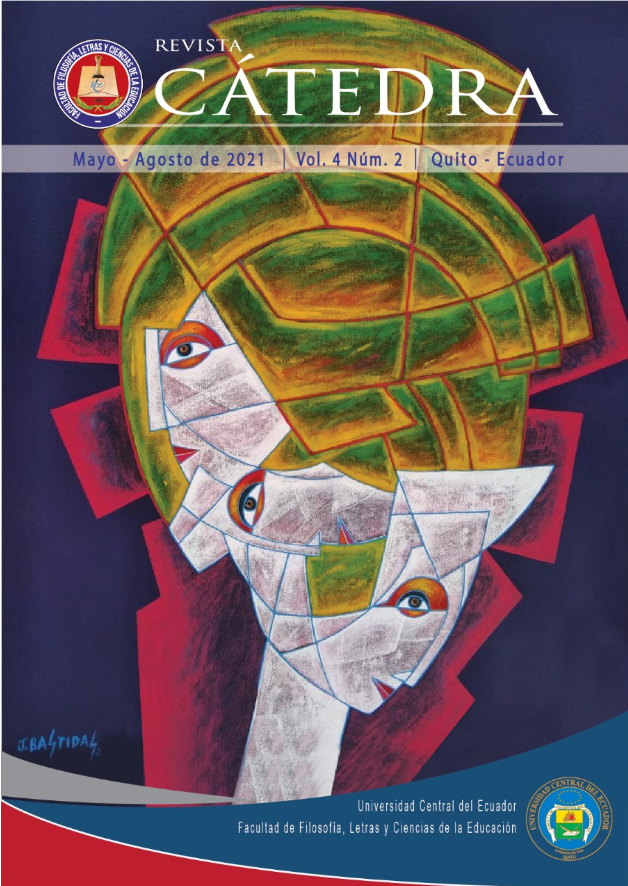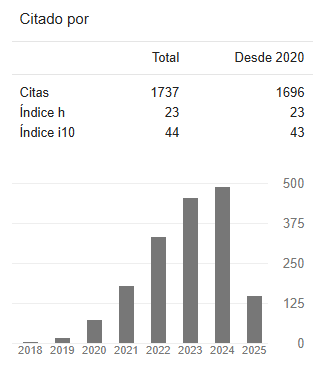Design of an educational mobile application through app inventor to reinforce the learning process in operations with whole numbers
DOI:
https://doi.org/10.29166/catedra.v4i2.2950Keywords:
App Inventor, gamification, learning, whole numbersAbstract
At present the development and implementation of new technologies has become necessary in all areas, in education it is born with the obligation to use new tools that help to enhance learning. This proposal analyzes an educational mobile application designed on the App Inventor platform, which helps to reinforce the learning process of whole number operations. The ease of use of the free online platform was used to structure all the content in a striking way according to the academic level of the user. Thus, several screens were developed in the application called MatEstudio, each of these screens serves to strengthen the learning process. These screens are made up of theory, simulators, and a game that together help reasoning and knowledge retention. The level of theoretical mathematical knowledge and in Information and Communication Technologies of students of Basic General Education was determined. Subsequently, a survey was applied, in which, based on the results obtained, it was possible to show that there is a problem for the correct understanding of the theory and practice of operations with integers. In this way, it was concluded that it is feasible to implement an Educational App created in App Inventor to reinforce the learning process of operations with numbers.
Downloads
References
Almaraz, F., Maz, A., y López, C. (2016). Tecnología móvil y enseñanza de las matemáticas. Revista EPSILON. https://thales.cica.es/epsilon/?q=content/tecnología-móvil-y-enseñanza-de-las-matemáticas-una-experiencia-de-aplicación-de-app-invento
Almaraz, J; Campos, P y Castelo, T. (2015). Desarrollo de una aplicación Web para la gestión de Entornos Virtuales. https://eprints.ucm.es/13083/1/Memoria_SI_Final.pdf
Aranda, C., y Samaniego, V. (Abril de 2016). Análisis, diseño e implementación de una aplicación móvil que facilite el proceso de enseñanza-aprendizaje del lenguaje de los niños con síndrome de Down del inicial II de la fundación FASINARM de Guayaquil. Repositorio UPS. https://dspace.ups.edu.ec/bitstream/123456789/12636/1/UPS-GT001658.pdf
Artica, R. (2014). Desarrollo de Aplicaciones Móviles. http://repositorio.unapiquitos.edu.pe/bitstream/handle/UNAP/4515/Robertho_Tesis_Titulo_2014.pdf?sequence=1&isAllowed=y
Ausubel, D. (1983). Teoría del aprendizaje significativo. Fascículos de CEIF, 1(1-10). http://www.academia.edu/download/38902537/Aprendizaje_significativo.pdf
Borrego, Á. (2012). Introducción a Android. 1–22
EL UNIVERSO. (2019). Ecuador reprobó en matemáticas en evaluación internacional. https://www.eluniverso.com/guayaquil/2019/02/26/nota/7207946/matematicas-no-se-paso-prueba
Enríquez, J y Casas, S. (2013). Usabilidad en aplicaciones móviles. https://dialnet.unirioja.es/descarga/articulo/5123524.pdf
Gaitán, V. (2013). Gamificación: el aprendizaje divertido.
García, D. (2018). Objeto virtual de aprendizaje de las operaciones adición y sustracción de números enteros. universidad pedagógica nacional. http://hdl.handle.net/20.500.12209/10235
Hernández, R. (2014). Metodología de la Investigación. Cuarta Edición. México. Interamericana Editores, S.A.
http://200.11.208.195/blogRedDocente/alexisduran/wpcontent/uploads/2015/11/CONFIABILIDAD.pdf
Jiménez, N., y Larrea, A. (2017). Aplicación informática (App Inventor): Herramienta para el aprendizaje de algoritmos. Revista RECITIUTM. http://www.recitiutm.iutm.edu.ve/index.php/recitiutm
Listán, M., Mota, J., Muriel, M., Barreno, F., Ruiz, A., y Vidal, J. (2018). Desarrollo de la app VectorialZ para la visualización interactiva de gráficos creados con software matemático. https://indoc.uca.es/articulos/sol-201700083572-tra.pdf
Medina, J. (2018). Aplicaciones Móviles ¿Vale la pena para tu empresa? Emprendedor en la nube. https://www.emprendedorenlanube.com/moviles/son-necesarias-las-aplicaciones-moviles.php
MIT. (2012). MIT APP INVENTOR. http://appinventor.mit.edu/about-us
Pérez, J. (2019). HERRAMIENTAS TECNOLÓGICAS PARA EL APRENDIZAJE LÚDICO DE LA MATEMÁTICA EN LOS ESTUDIANTES DE NOVENO DE EDUCACIÓN GENERAL BÁSICA SUPERIOR DEL COLEGIO DE BACHILLERATO “CHAMBO”. http://repositorio.uti.edu.ec//handle/123456789/1353
Posada, F. (2008). Creando aplicaciones para móviles Android con App Inventor 2. https://intef.es/wp-content/uploads/2019/03/MIT-App-Inventor-2.pdf
Radio Huancavilca. (2019). Ecuador reprobó matemáticas en evaluación internacional. https://radiohuancavilca.com.ec/ecuador-reprobo-en-matematicas-en-evaluacion-internacional/
Rumiche, C. (2019). Ecuaciones e inecuaciones en el conjunto de los números enteros. http://dspace.unitru.edu.pe/handle/UNITRU/14838
Sánchez, I. (2003). Elementos conceptuales básicos del proceso de enseñanza-aprendizaje. ACIMED, Ciudad de La Habana, v. 11, n. 6, dic. 2003. http://scielo.sld.cu/scielo.php?script=sci_arttext&pid=S1024- 94352003000600018&lng=es&nrm=iso
Sanz, I. (2018). Propuesta de aprendizaje para estudiantes del siglo XXI, proyecto colaborativo basado en APP Inventor. https://hdl.handle.net/2454/31154
Statista. (2018). • Mobile OS market share 2018 | Statista. Retrieved May 19, 2019, from https://www.statista.com/statistics/266136/global-market-share-held-by-smartphone-operating-systems/
Valdez, R. (2018). Curso de introducción a la programación de computadoras utilizando el software app inventor en el instituto de cooperación social http://www.repositorio.usac.edu.gt/id/eprint/8741









